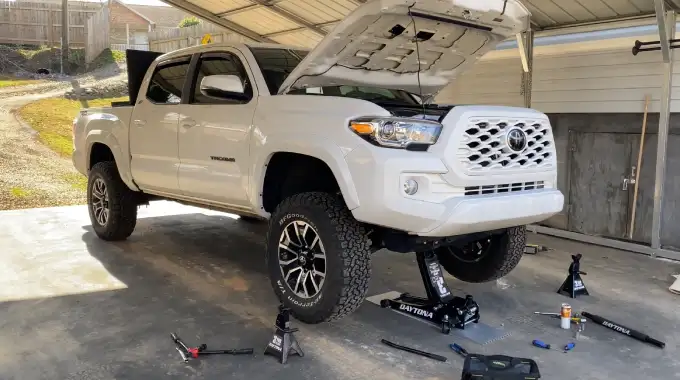Last Updated on April 19, 2023
As any DIY enthusiast knows, a trusty floor jack is an essential part of the home garage or workshop.
But when your faithful equipment decides to give up on you and its handle starts playing tricks, it can be incredibly tedious and even hazardous. From 3-ton jacks to smaller ones, this malfunctioning issue seems common across all capacities.
Have you ever been in a situation where your car won’t lift off the ground? It’s something we’ve all dreaded, yet it can stem from a variety of causes, from lack of hydraulic fluid to an abundance of air or damaged arms. Knowing why your handle isn’t turning can help get you on the move again.
The culprits behind such cases are explained in this helpful blog post, along with tips on fixing them.
Why My 3 Ton Floor Jack Handle Wont Turn: Main Reasons
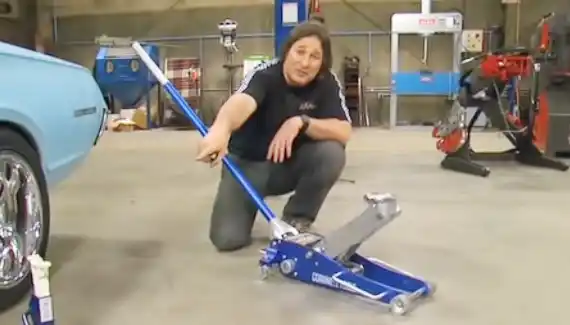
Having a 3-ton floor jack makes even the most daunting heavy-lifting task seem manageable. Whether you’re lifting a car, truck, van, or other large objects, all you need is this tool. Unfortunately, something could be wrong with your jack if its handle isn’t turning as it should.
The following are a few possible reasons:
Broken Gear Rack
The gear rack is a crucial component in its operation, and any damage to it can result in the inability of the handle to turn. The most common cause of damage to a gear rack is wear and tear from constant use.
This can occur over time due to regular use or by not using the jack for extended periods of time, which can lead to rusting and corrosion on the metal parts. The grinding between components may also be caused by improper maintenance or lubrication.
Hydraulic Oil Is Low or Contaminated
Low fluid levels within a 3-ton floor jack may be caused by leaks in the system that are allowing hydraulic oil to drain out. If your hydraulic oil gets contaminated, it will cause problems with the handle being unable to turn. This will create a blockage in the system, reducing its effectiveness significantly.
Air In the System Blocking Fluid Flow
The gaskets in a 3 ton floor jack system can fail, which lets air into the system. Bubbles form in the fluid, which makes it harder for the fluid to move through the pipes and hoses because of the increased friction.
Pressure regulation devices help keep pressure in the system. But if these devices do not work, then there might not be enough pressure in the system. This would cause problems when people try to turn the handle.
Aside from that, if some of the parts don’t have rubber seals, then air might get in while it is running. This would make it harder to turn the handle.
Corrosion on Components Impeding Movement
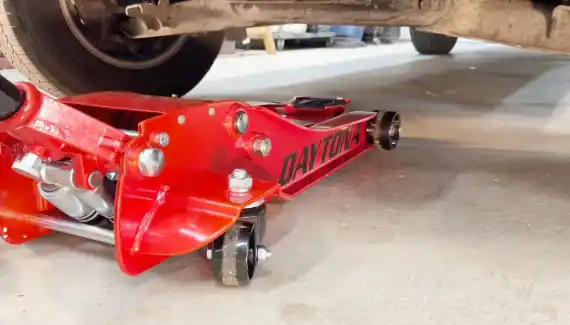
Corrosion on the inside parts of a 3-ton floor jack, such as gears, cams and levers, can cause the handle to turn less easily over time. This happens because rust builds up and gets in the way of these moving parts.
Note: To prevent this, inspect all internal components for rust and corrosion and apply lubricant where necessary (or replace parts if necessary).
Damaged Lift Arm
The lift arm of a 3 ton floor jack is responsible for providing stability and support when lifting heavy objects. Over time this arm can begin to show signs of wear and damage due to prolonged use or poor storage conditions.
If the lift arm becomes warped or bent, it can make it very difficult for the user to turn the handle on their 3-ton floor jack. You should replace a damaged lift arm if you notice wear or damage, as continuing to use a damaged lift arm could cause irreparable damage.
Bent Release Valve Stem
The release valve stem on your 3-ton floor jack controls how much pressure is applied during lifting operations. Bending or misaligning this stem could prevent the handle from turning completely and interfere with hydraulic flow control, resulting in pressure buildup inside the stem.
It is advisable to try resetting the valve by moving it up and down several times before slowly turning it clockwise until it clicks into position again before making any repairs. Once this has been done you should test if your handle still won’t turn before proceeding with any other repairs or replacements.
Faulty Hydraulic System
The hydraulic system is what allows operators of the 3-ton floor jack to lift heavy objects safely and securely without damaging them or themselves. Even if everything else appears to be fine, leaks in this system may result in insufficient pressure being applied, causing difficulty turning the handle of your equipment.
If you think there might be a leak, ask a professional to take a look at your gear. They can help you figure out where the problem is and how to fix it.
What Are the Consequences If the Floor Jack Handle Won’t Turn?
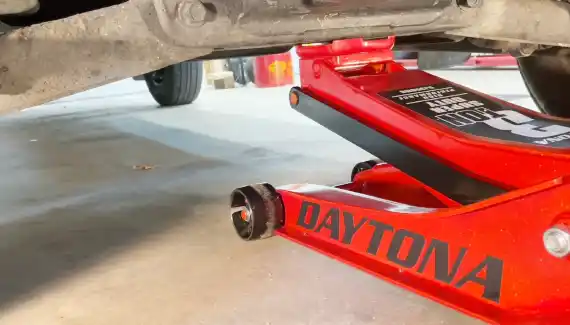
If the handle on your floor jack won’t turn, it can be a significant problem. Here are some of the potential consequences:
1. Difficulty Moving Loads
The first consequence of a floor jack handle not turning is difficulty moving loads. Without the ability to control the height and position of an item with the jack, it can be difficult to get it into the right place for repairs or maintenance work.
2. Lack of Control
A subsequent issue related to difficulty moving loads is a lack of control while operating the floor jack. Because you don’t have any leverage, you can’t place the load where you want and lift it as high as you want.
3. Damage or Injury May Occur
Using a floor jack with a stuck handle can cause injury or damage since you can’t control how far and fast you raise or lower the object. This can be especially dangerous if working with large loads or unstable materials, such as vehicles.
4. Stressful and Costly Repairs
Repairing a floor jack handle that won’t turn requires replacing several small but essential components. Which adds additional stress and cost to any repair job. This can also involve taking apart multiple parts of the device for it to function correctly again.
5. Need For Professional Assistance
Ultimately, professional assistance may need to be sought out to properly fix issues with a nonfunctioning handle on a floor jack. Which could end up being quite costly depending on who is hired for the job and how much their rates are etc.
Tips to Avoid Getting a Stuck Floor Jack Handle
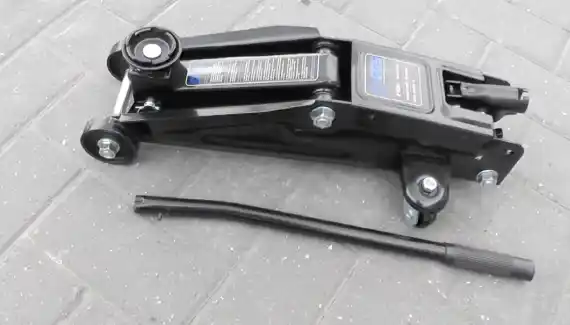
Working with a stubborn floor jack handle? Avoid the hassle and wasted time by taking proactive steps to prevent this from happening. Taking a little preventive maintenance can help you avoid unnecessary roadblocks.
For a quick fix, try these tips:
- Always check the fluid levels regularly and refill if necessary. The hydraulic system should also be checked to ensure there are no leaks.
- Use a clean cloth and some lubricant spray or grease to lubricate all the moving parts of the jack. This should help loosen up any stuck components and allow you to turn the handle again.
- Ensure that the handle is properly inserted into the socket of the floor jack before use. Don’t lift or lower a load with a loose handle because it’ll get stuck.
- Overloading a floor jack will put undue strain on its parts and may cause them to fail sooner. Always check what the maximum lifting capacity for your particular model is and avoid exceeding it at all costs.
- If metal parts get too cold or too hot, or if there is too much moisture, the metal can rust. Store your floor jack indoors in a dry area when not in use, and apply an appropriate rust protection coating.
- Occasionally check your floor jack’s handle for chips, dents, scrapes, etc., since any kind of damage could cause it to get stuck later on.
- Utilizing leverage techniques such as using two hands when turning/lifting/lowering heavy loads. This can help reduce wear and tear on both yourself and your equipment alike.
- People often make the mistake of forcing their devices too hard when trying their hardest. Always keep in mind that no tool was designed with brute-force applications in mind.
Do Release Valves Help to Avoid Stuck Handles On Floor Jacks?
Floor jacks require release valves for safe usage, allowing excess hydraulic fluid to be released before pressure can damage the internal mechanism. With this vital component installed on your jack, you can enjoy worry-free lifting without fearing a jammed handle.
By relieving pressure, it also helps to ensure that the handle remains smooth and easy to operate. In addition, when properly maintained and adjusted, a release valve can even help improve the lifespan of a floor jack by preventing too much wear and tear on its internal components.
Why Do You Need Oil In a 3 Ton Floor Jack?
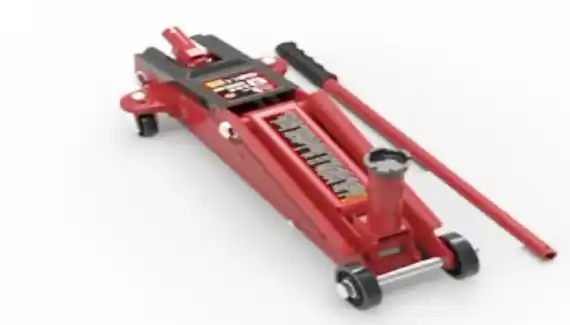
Oil is an essential component of any 3 ton floor jack. It is used to lubricate the internal mechanisms, which makes it easier for them to move and function correctly. Without this lubrication, friction between the components would increase, leading to damage over time, stuck handles, and other issues.
The oil also helps to cool the floor jack by dissipating heat generated by its components during use. This is essential for maintaining long-term durability and optimal performance. It also helps reduce heat buildup from friction, allowing it to operate more efficiently.
Aside from its lubricating function, oil can also protect components from rust and corrosion caused by moisture and other factors.
Tune Up Your Jack Fluid Levels for Optimal Performance
So, if your floor jack is feeling sluggish and the handle won’t budge, take a look at its hydraulic fluid levels first. If they’re good, you might need to do some extra maintenance work to get everything running smoothly again.
As always, prevention is key, and regular maintenance of your gear should help prevent any stuck handles in the future. Hopefully, now you understand why your 3-ton floor jack handle might not turn and have some ideas to prevent any future malfunctions.
